Chinese Way
Clearing the air
Updated: 2011-08-25 07:44
(China Daily)
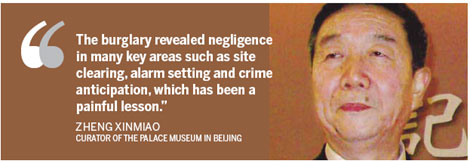
Zheng Xinmiao, curator of the Palace Museum in Beijing, responds to the 10 scandals the museum has been involved in recently.
Burglary
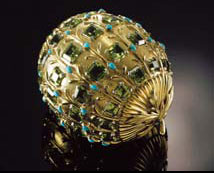
At midnight on May 8, nine modern gold and silver purses (pictured right) and cosmetic containers, on loan from a private Hong Kong museum, were stolen from the Hall of Abstinence (Zhai Gong). Two were found soon after in a corner of the museum, but had been damaged.
On May 11, the suspect Shi Bokui was arrested. The three stolen artifacts are still missing.
"We admit there are indeed some problems and loopholes in our management. Some tip-offs did not fit the facts and some others could not be verified.
The burglary revealed negligence in many key areas such as site clearing, alarm setting and crime anticipation, which has been a painful lesson. Those responsible have been punished."
Wrongly written character
On May 13, the Palace Museum honored the Beijing Municipal Bureau of Public Security with a silk banner to commend them for their work in cracking the burglary case. But instead of the Chinese character han, which means to protect, it had a homophone, which means to shake.
On May 14, the Palace Museum refused to admit the mistake; but on May 16, it apologized on its micro blog.
"This incident seriously harmed the museum's reputation. People would have better accepted it had we admitted the mistake right after it became public. We are sorry for not making a timely correction and for blaming the error on subordinates."
Exclusive Club
On May 11, presenter Rui Chenggang of China Central Television (CCTV) exposed on his micro blog that Jianfu Palace within the Forbidden City was to be turned into an exclusive club, for which 500 memberships would be sold worldwide.
"We have clarified that the Palace Museum has never considered opening any club within the Forbidden City. Jianfu Palace garden, which was rebuilt on ruins, will continue to be used for press conferences, small-scale exhibitions, charity activities and for meeting foreign guests.
We have told the Beijing Forbidden City Cultural Development Co that the club idea is a violation of our agreement. We should have supervised our partner and clarified everything to the public upfront."
Broken plate
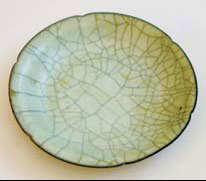
On July 4, the Celadon Plate with a Mouth in the Shape of Mallow Petals (pictured right), a first-class Ge ware national treasure of the Song Dynasty (960-1279), broke into six pieces when a researcher made a wrong adjustment to the testing device during a pressure test.
The museum did not report or admit the incident until July 31, after it was exposed on a micro blog by a whistle blower by the name "Longcan".
"The accident was caused by the inadequacy of measures to protect relics, poor anticipation and lack of personnel training. We take full responsibility for not reporting the incident to the authorities as soon as it happened."
Cover-ups
On Aug 2, the same "Longcan" revealed that the Palace Museum had covered up four other accidents in which important artifacts had been damaged in recent years.
"I will explain one by one all the four rumors of relic damage that 'Longcan' exposed in his micro blog.
The first concerns the loss of 10 so-called 'Buddha statues'.
On June 9, 2006, two employees mistakenly threw away a wooden box containing a 16-piece stone chime. Sun Huisheng, another employee, reported this to the relevant department as soon as he discovered it. The 16 pieces were recovered intact.
The second rumor said a talisman of the Ming Dynasty (1368-1644) was damaged in 2006. The fact is, on May 27 and Sept 6, 2004, two porcelain wares were damaged by incorrect handling by staff.
As to the third rumor of a Buddha statue damaged in 2008, no such accident ever occurred.
The fourth rumor said an artifact was smashed when a staff member, Ren Wanping, carried it under his arm. An investigation found that a glass flower receptacle was damaged in 2009, but not because of any handling errors."
Damaged wall panel
A report said a rosewood bird-and-flower wall panel with jade inlay work, part of the collection of the Qing court, was soaked and damaged during repair.
"On June 15, 2011, the hanging panel was sent to the technology department to be cleaned of dust and repaired. On July 25, the staff found that water leaking from a water pipe had dripped on to the quilt covering the panel and permeated it. After on-site examination, experts said no damage had been done by the water."
Hush money
A report said some employees of the museum had pocketed ticket revenues in 2009. Their actions were filmed by a witness who asked the museum for 200,000 yuan ($31,300) in hush money. The museum compromised and gave 100,000 yuan to cover up the scandal.
"In July 2009, an informer reported to the museum that employees at Wumen Gate had let tourists pass without issuing them tickets. The informer claimed he would provide evidence and assist in arrests only if the museum offered him a cash award of 150,000 yuan. The museum finally promised the informer 80,000 yuan if the evidence was solid. On Aug 11, 2009, police intercepted a tourist group of 130, with used invalid tickets, and caught the suspect and illicit money of 7,660 yuan, with the informer's help."
Auction
On Aug 5, another rumor said the Palace Museum had bought five rare Song Dynasty letters (pictured below) during an auction in 1997. But in 2005, the five letters showed up again on the auction market and were sold for three times the price they had fetched in 1997.
"In 1997, we arranged with Beijing Hanhai Auction Co Ltd the purchase of the five letters at its auction and applied for funds. But we never got a reply about the funding.
In the book 80 Years of the Palace Museum published in 2005, and in the section Chronicle of Events on our website, mention is made of the purchase and this is because our employees mistakenly referred to the application of funds."
Ancient book
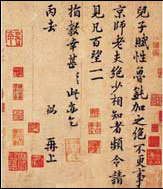
An informer, who claimed to be part of the Palace Museum staff, reported the loss of some ancient books in the museum library.
"In the past seven years, the Palace Museum has been sorting out ancient books, and making a record of missing volumes. By 2009, more than 100 out of 200,000 volumes could not be accounted for. The checking has not been completed as yet so these books can still not be firmly identified as lost."
Tax evasion
A report said tickets to commercial exhibitions held outside Duanmen Gate do not contain the tax stamp, which puts the Palace Museum under suspicion of tax evasion.
"Those commercial exhibitions have existed for many years in the Duanmen Gate area, and have not been under the Palace Museum. We are currently in the process of taking back those rented buildings, which will be used for ticket sales, information and guidance and no more exhibitions."
Xinhua

Specials

Biden Visits China
US Vice-President Joe Biden visits China August 17-22.

Star journalist leaves legacy
Li Xing, China Daily's assistant editor-in-chief and veteran columnist, died of a cerebral hemorrhage on Aug 7 in Washington DC, US.
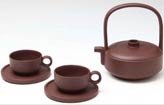
Hot pots
Tea-making treasures catch the fancy of connoisseurs as record prices brew up interest